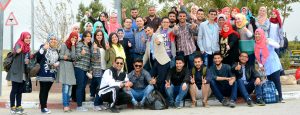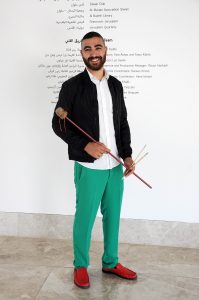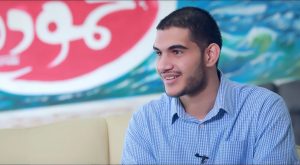In the West Bank, the Gaza Strip, and East Jerusalem, youth represent about one-third of the population. It is this young generation that constitutes the basis for developing the Palestinian society and economy amid rising unemployment and an unstable political situation. Every August is the time of year when the injaz (tawjihi) results are out, and the new cohort of young Palestinians prepares the next steps in their path through life. Even though the ratio of unemployed academic graduates is extremely high, most young people and their families dream of a future as medical doctors, engineers, or lawyers. But it is also important that the real and tangible benefits of a vocational alternative for a bright economic and social life be highlighted.
Youth unemployment in the Palestinian territories stands at around 40 percent. Particularly affected are young women and youth from marginalized areas, such as East Jerusalem, Area C, refugee camps, and Gaza, where youth unemployment reaches 60 percent. Data and information are not always detailed, but we work under the assumption that companies are not able to find sufficiently qualified employees. This can be derived from the insufficient quality and quantity of training at technical and vocational education and training (TVET) institutions and/or the lack of attractiveness of vocational education in Palestinian society.

Within the context of the German-Palestinian development cooperation, Deutsche Gesellschaft für Internationale Zusammenarbeit (GIZ) GmbH – known as GTZ until 2011 and financed by the German Federal Ministry for Economic Cooperation and Development (BMZ), furthermore the European Union, the Swiss Development Cooperation (SDC), and the Norwegian Agency for Development Cooperation (NORAD) – has supported and worked with the Palestinian Authority since the mid-1990s in strengthening the links between the demand from the private sector/labor market and the offers from the TVET providers to bring more young Palestinians into a valuable workplace. In this journey we have learned from and worked for thousands and thousands of people such as Mahmoud, Walaa, Mais, and Ameen, who are the protagonists of the stories we want to share here.

When referring to technical and vocational education, the broader layer includes all formal or informal measures to enhance skills and competencies required for a specific occupation. Hundreds of TVET providers function in Palestine (for profit, NGO-run, public), most of them accredited by the Ministry of Labor or the Ministry of Education and Higher Education through the Accreditation and Quality Assurance Commission (AQAC).
The Palestinian TVET Strategy 2010, which is currently being revisited, aims to create a knowledgeable, competent, motivated, entrepreneurial, adaptable, creative, and innovative workforce in Palestine, contributing to poverty reduction and social and economic development through facilitating demand-driven, high-quality technical and vocational education and training, relevant to all sectors of the economy, at all levels and to all people.

GIZ’s current (2019) portfolio covers a broad range of TVET topics: introducing youngsters from refugee camps and all other areas in East Jerusalem, the West Bank, and Gaza to TVET by organizing orientation days and summer school programs at some vocational training centers, industrial/agricultural secondary schools or colleges; supporting the sector ministries in enhancing and structuring their TVET offers and guaranteeing quality of delivery for their students in the fewer than 40 public TVET institutions; supporting Al-Quds University in East Jerusalem since 2015 in offering bachelor’s degrees in four study specializations based on the German model of labor-market-oriented higher education. The dual studies system remains unique to the entire MENA region. It aims to provide young students with a competitive professional and practical experience that allows them to bridge the gap between the needs of the labor market on the one hand, and the learning outcomes on the other.
Mais Hantash is a trainer with the Ministry of Labor. She comes from Khars, a small village in the Hebron area. When the Train the Trainers Project started, she was nominated as one of the potential multipliers who would be able to train teachers and trainers on their pedagogical competencies in the future. This work process is implemented by experts from GFA, a German consulting group. She had to commute to training sessions and drive back home every day. She performed outstandingly and will be able to further disseminate the action-oriented learning approach in Palestine. According to Mais, this learning and acting opportunity was very motivating, and she will replicate her experience according to the requests from the Ministry of Labor. This is an important step in the sustainability of the pedagogical training of TVET staff.

Ameen Abu Baker from Rummana, Jenin participated successfully in the WorldSkills Competition in Abu Dhabi 2017. He studied painting and decoration for 10 months at the Vocational Training Centre in Jenin and graduated in 2016. Ameen was one of 27 enrolled in the painting and decoration program. He chose this area because he believes that the market lacks skilled labor in this field. With his passion and determination, Ameen won first place in the First National Competition for Skills in Palestine. After a year and a half, he was ready to join the Abu Dhabi WorldSkills Competition in 2017. He was lucky to have the opportunity to be trained in Jenin and abroad by Austrian experts. During the world competition, he was one of the few who could accomplish the required tasks and returned home having achieved the commendable rank of 9th place! In August 2019, three other young professionals showed their skills in the world competition in Kazan/Russia.

Twenty-year-old Mahmoud Zere’i of East Jerusalem is studying information technology and is one of around 240 Palestinian students enrolled in the Dual Studies program at Al-Quds University, the first undergraduate degree program in the entire MENA region that combines theoretical in-class learning with continuous practical training at Palestinian partnering companies throughout the course of study. Based on the German model of labor-market-oriented higher education, the program aims to reduce the unemployment rate of university graduates in Palestine by offering labor-market-driven curricula and practical training. This is supported by the GIZ program More Job Opportunities for Palestinian Youth. In a very short period of time, Mahmoud has proved his competence and earned the trust of the company where he is doing a practicum. He has recently been offered a permanent work contract. He managed to find a place in the labor market even before finishing his studies!
On behalf of the European Union, GIZ has implemented broad TVET support, including engaging with many young Palestinians, for example, Wala’ Nassar. She got married directly after completing tenth grade. Later, Wala’ wanted to learn a profession that she liked and that could help her to financially support her young family. So, she joined Culinary Art and Catering at Sa’eb Al-Nazer TVET institute in Hebron. When Wala’ graduated in 2016, she opened a small sweet shop in Dura city in Hebron – Walaa Sweets – which has met with great success. She has since opened a second sweet shop and has convinced her husband to manage it.
Let’s spread the word: do TVET!
Photos courtesy of the authors.


